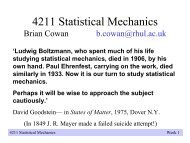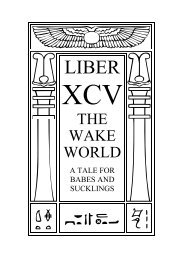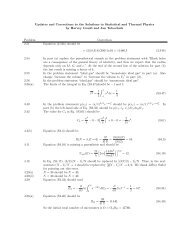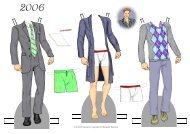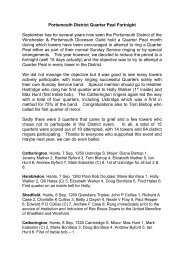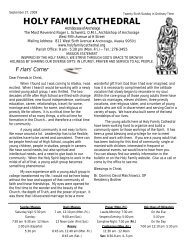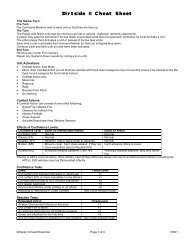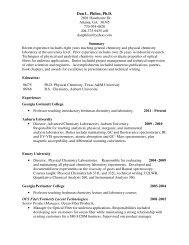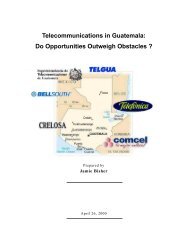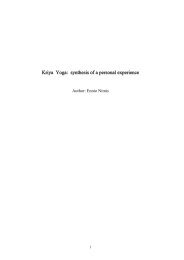A Critique of The German Ideology
A Critique of The German Ideology
A Critique of The German Ideology
You also want an ePaper? Increase the reach of your titles
YUMPU automatically turns print PDFs into web optimized ePapers that Google loves.
and in opposition to one another, whilst, on the other hand, these forces are only real<br />
forces in the intercourse and association <strong>of</strong> these individuals. Thus, on the one hand, we<br />
have a totality <strong>of</strong> productive forces, which have, as it were, taken on a material form and<br />
are for the individuals no longer the forces <strong>of</strong> the individuals but <strong>of</strong> private property, and<br />
hence <strong>of</strong> the individuals only ins<strong>of</strong>ar as they are owners <strong>of</strong> private property themselves.<br />
Never, in any earlier period, have the productive forces taken on a form so indifferent to<br />
the intercourse <strong>of</strong> individuals as individuals, because their intercourse itself was formerly<br />
a restricted one. On the other hand, standing over against these productive forces, we<br />
have the majority <strong>of</strong> the individuals from whom these forces have been wrested away,<br />
and who, robbed thus <strong>of</strong> all real life-content, have become abstract individuals, but who<br />
are, however, only by this fact put into a position to enter into relation with one another<br />
as individuals.<br />
<strong>The</strong> only connection which still links them with the productive forces and with their own<br />
existence -- labour -- has lost all semblance <strong>of</strong> self-activity and only sustains their life by<br />
stunting it. While in the earlier periods self-activity and the production <strong>of</strong> material life<br />
were separated, in that they devolved on different persons, and while, on account <strong>of</strong> the<br />
narrowness <strong>of</strong> the individuals themselves, the production <strong>of</strong> material life was considered<br />
as a subordinate mode <strong>of</strong> self-activity, they now diverge to such an extent that altogether<br />
material life appears as the end, and what produces this material life, labour (which is<br />
now the only possible but, as we see, negative form <strong>of</strong> self-activity), as the means.<br />
Thus things have now come to such a pass that the individuals must appropriate the<br />
existing totality <strong>of</strong> productive forces, not only to achieve self-activity, but, also, merely to<br />
safeguard their very existence. This appropriation is first determined by the object to be<br />
appropriated, the productive forces, which have been developed to a totality and which<br />
only exist within a universal intercourse. From this aspect alone, therefore, this<br />
appropriation must have a universal character corresponding to the productive forces and<br />
the intercourse.<br />
<strong>The</strong> appropriation <strong>of</strong> these forces is itself nothing more than the development <strong>of</strong> the<br />
individual capacities corresponding to the material instruments <strong>of</strong> production. <strong>The</strong><br />
appropriation <strong>of</strong> a totality <strong>of</strong> instruments <strong>of</strong> production is, for this very reason, the<br />
development <strong>of</strong> a totality <strong>of</strong> capacities in the individuals themselves.<br />
This appropriation is further determined by the persons appropriating. Only the<br />
proletarians <strong>of</strong> the present day, who are completely shut <strong>of</strong>f from all self-activity, are in a<br />
position to achieve a complete and no longer restricted self-activity, which consists in the<br />
appropriation <strong>of</strong> a totality <strong>of</strong> productive forces and in the thus postulated development <strong>of</strong><br />
a totality <strong>of</strong> capacities. All earlier revolutionary appropriations were restricted;<br />
individuals, whose self-activity was restricted by a crude instrument <strong>of</strong> production and a<br />
limited intercourse, appropriated this crude instrument <strong>of</strong> production, and hence merely<br />
achieved a new state <strong>of</strong> limitation. <strong>The</strong>ir instrument <strong>of</strong> production became their property,<br />
but they themselves remained subordinate to the division <strong>of</strong> labour and their own



